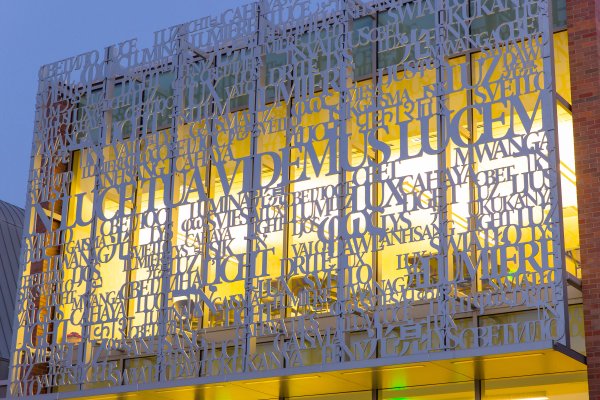Bon Appétit: French Majors Cook up Final Project in the Kitchen
The recipe for success for two French language majors at Valparaiso University literally was a recipe. Jennifer LeCaptain ’16 and Andrea Sanchez ’16 took experiential learning out of the classroom and went back in time to produce a 21st-century cookbook.
The brainchild of Timothy J. Tomasik, Ph.D., associate professor of foreign languages and literatures, was to take a 16th century Renaissance French cookbook and not only transcribe it into modern-day French but code it to become a living digital document. The cherry on top was having the students prepare a menu that would be shared with classmates and colleagues.
No blue book was need for this final. Instead, flatware and dishes for a four-course banquet replaced the pencil and paper.
“The nature of this class and this project was atypical,” Professor Tomasik says. “That said, experiential learning is part of every foreign language class. Language learning can’t be separated from a social circumstance.”
The project certainly included a fair amount of research, but there was plenty of hands-on activities, as well.
“This was a project where the students could make something and think of an audience outside of the professor and fellow students in class,” Professor Tomasik says.
From the Renaissance to the web
The pair of students had quite the task ahead of them for their semester-long senior seminar class. First, the students had to take 16th century French and transcribe the gothic script into modern-day type. From there, they coded the text using XML (extensible markup language). They also had to decipher certain abbreviations that would be key to the recipes and decide if they needed to use the full word or if the abbreviation translated appropriately. Professor Tomasik pointed out that in some cases there could be eight to 10 lines of code for one abbreviation.
“It was extremely rewarding to see that we were able to do such a unique project that shows a different manner in which a language can be learned,” Andrea says. “We were able to learn different cultural aspects that were shown in how the text was actually written.”
The students also received an education in computer sciences along the way. In order to digitize the 16th century script, they worked with Nick Rosasco, D.Sc., assistant professor of computing and information sciences, and his students to translate their coded version of the work into a web page that can be updated with additional cookbooks and recipes.
“While the text was old, the solutions for handling it were state of the art. Both the XML work to create the core document and the TEI (text encoding initiative) boilerplate software extensions for presenting it would ordinarily be the province of graduate students at most institutions.” Professor Rosasco says.
Making it come to life
For Professor Rosasco, this project also brought his students out of their comfort zone and provided a true real-world experience. “Working across fields is common in software, but getting to work so far from the more usual questions — like business processes or scientific computation projects — is unique,” Professor Rosasco says. “The complexities of working with subject matter experts in the humanities, and working with a complex technical suite like TEI boilerplate, are difficult to create in standard classroom settings. This was a unique ‘live’ challenge for everyone concerned.”
Jennifer agrees. “We got to see that learning a foreign language is more than just grammar and literature, diving into it with hands on research,” she says. “It is really neat that the work we did to make this cookbook digital now makes it available to other scholars and can help them with their research.”
This unique way to teach and learn is a distinguishing factor for the French program at Valpo. In fact, the American Association of Teachers of French Committee on Exemplary Programs recognized Valpo’s French program as one of 11 “exemplary programs with honors” in the nation.
“The unique aspect to this project was that when we got to the end there was this actual product,” Professor Tomasik says. “The digital edition can and will change over time. That’s not the case with a printed edition. For the latter, there is no update until you print another one.”
The end product won’t exactly sit on a computer hard drive and collect cyber dust if Professor Tomasik has his way. “This text is part of a larger family of cookbooks. In some ways, I see on the horizon a digital archive of every edition.”
Now that will be one big French feast.
